If your goal is to burn fat, lose weight or build muscle, then putting your exercise regime on hold for the entire month of Ramadan can set you back a long way with your goals.
The 30-day fasting period during the Holy Month means refraining from consuming food and drink in the long hours from dawn until sunset. However, Ramadan doesn’t mean you have to put your fat loss or muscle building goals on hold.
Such long hours without food or water can put a large amount of stress on your body – but with some careful planning and smart training advice you can still lose weight or grow muscle during Ramadan safely and effectively.
This complete guide to fat loss, diet and training during Ramadan will show you:
- How to workout during Ramadan
- What is the best cardio for fat loss
- How to plan your diet
- How to create a meal plan for your goals
- Which supplements are best for your health
Here are our top tips and advice on navigating your way through Ramadan to help ensure your health and fitness goals can still be achieved.
Fat loss during Ramadan
If you want to burn fat or lose weight during Ramadan, the normal fat loss principles apply.
Creating a consistent calorie deficit (expending more calories than you consume in a day) is key when it comes to fat loss.
The best way to achieve this is through a combination of eating less and increasing your exercise and daily activity levels.
Resistance training, in particular, is important to help preserve your muscle and strength.

Can you workout during Ramadan?
If you are thinking about training or doing a workout during the month of Ramadan, the secret is to ‘stimulate, not annihilate’.
It’s important to take a more measured approach to your training while fasting – and that’s something we do with all our personal training clients at Ultimate Performance.
You shouldn’t be trying to hit your personal best lifts or starting a new high-intensity weight training regime (unless you’re truly feeling fit and strong after the fast).
It’s always advisable to use Ramadan as a period to maintain your fitness levels rather than drilling yourself into the ground.
Plan workouts that include effective whole-body weight training three sessions a week. This is a great approach to deal with the stress of fasting while still maintaining strength and muscle.
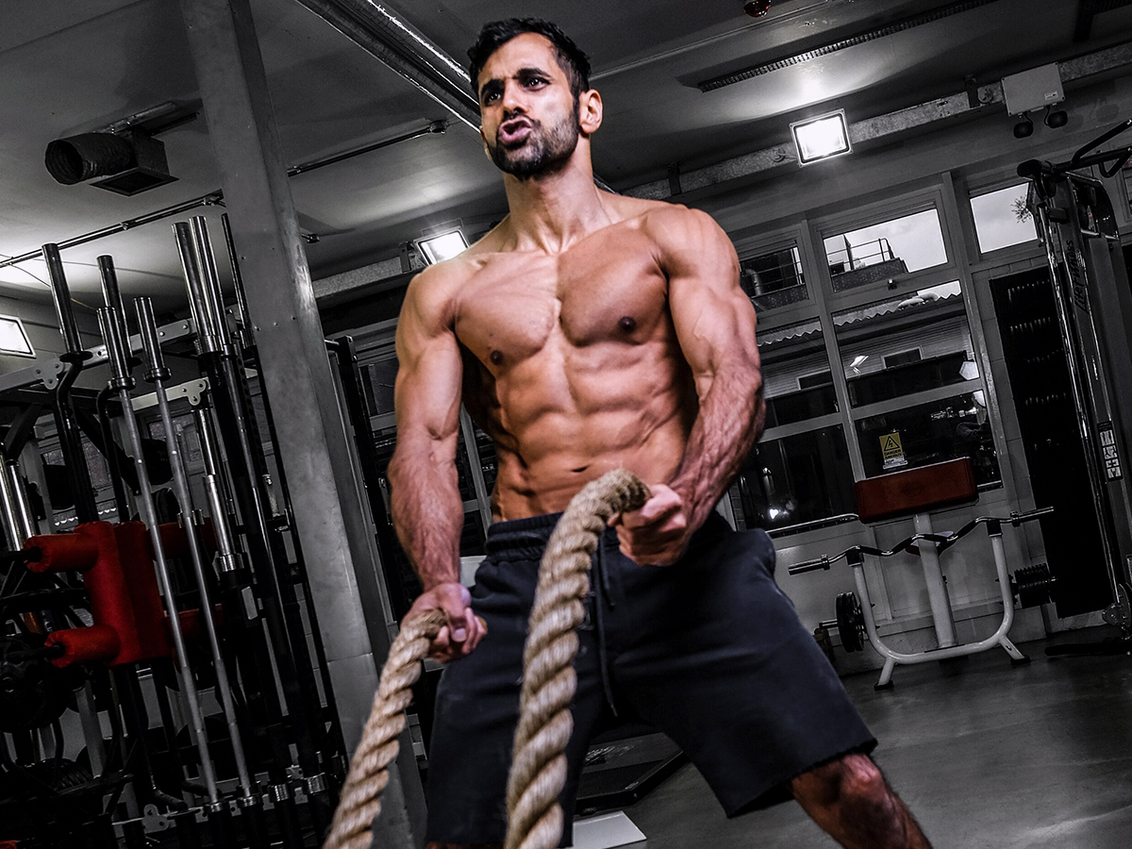
When is the best time to workout during Ramadan?
Training early in the morning is best during Ramadan after your first meal of the day. If this doesn’t work with your schedule, then hit the gym after your first main meal, after Iftar, so your body is well fuelled and has the right nutrients for optimal recovery.
How long should you workout during Ramadan?
Don’t feel you have to spend hours in the gym for an effective workout session. You can get a lot done in 45 minutes if you train hard and with intensity.
If your long-term goal is building muscle, an option during Ramadan could be to lower the load and add more sets to help maintain muscle mass.

Should I do cardio during Ramadan?
While weight training should be the cornerstone of any fat loss plan for both men and women, cardio can also play an important role in creating the energy deficit needed to lose weight.
There are two key types of cardio that you can consider during Ramadan which will help you burn fat optimally – high-intensity interval training (HIIT) and low-intensity steady state (LISS).
Is High Intensity Interval Training (HIIT) best for fat loss during Ramadan?
HIIT will give you the most ‘bang for your buck’ for fat loss as it’s fast, efficient and effective. Focus on quick bursts of 10-30 second maximum effort followed by 40-120 seconds of rest on a treadmill, watt bike, rower, sleds, prowlers, or just by sprinting outside. It is important to choose something you enjoy.
Although HIIT is highly effective for fat loss if done correctly, it is also very taxing on the body and tough on your recovery. During Ramadan, this is something to consider when your body is already under stress from fasting. So it may not be advisable to start a new HIIT programme during Ramadan if you’ve never done it before.
Is Low Intensity Interval Training (LISS) best for fat loss during Ramadan?
On the other hand, LISS is gentle and low intensity and could be a great fat loss tool for men and women fasting throughout the holy month.
The main benefit of LISS is that it’s very easy to recover from and can actually improve your recovery from strength training. It can be as simple as going for a walk, swim or bike ride at a gentle pace that will only slightly raise your heart rate. It doesn’t stress the body like HIIT, which is important during Ramadan; in fact, it can help de-stress if you’re going for a walk outside.
Whatever form of cardio you do will depend on your individual preference, goal, exercise history and lifestyle. It’s always advisable to consult a professional personal trainer for the right training programme for your individual needs.
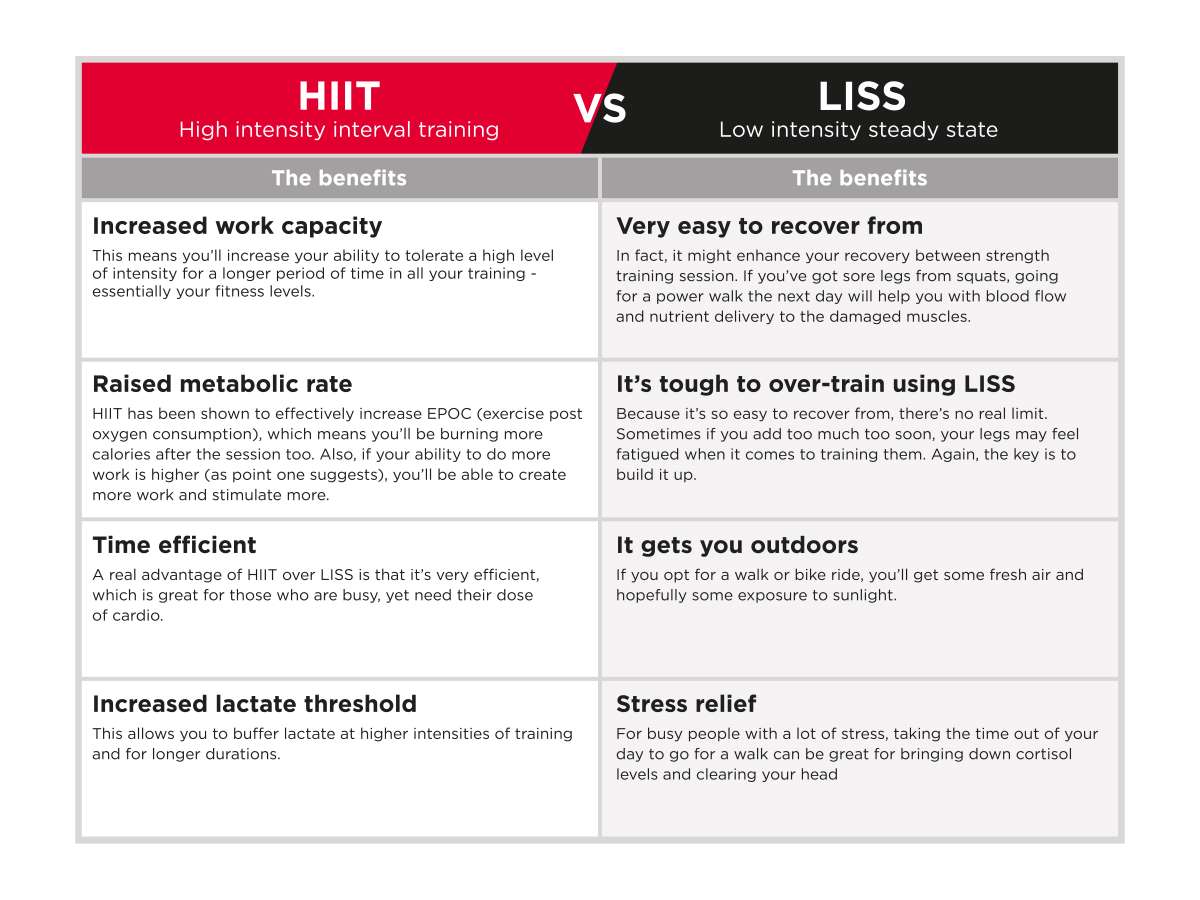
Is NEAT (Non-exercise activity thermogenesis) important for fat loss during Ramadan?
If you are not doing formal cardio workouts during Ramadan, but you still have a fat loss goal, it is important to stay active throughout the day.
The activity you do outside of the gym is just as important as what you do inside the gym for increasing your energy expenditure and burning fat.
You can increase your daily activity and calorie burn in many ways, including walking upstairs, walking for the train, having a standing desk, cleaning the house, doing chores or playing with the children.
These all fall under the bracket of NEAT, which relates to all other daily activities which burn calories.
The best way to track your activity levels is to get a step counter app on your smartphone fitness watch or buy a cheap pedometer to measure your steps.
A good base target to aim for every day is 10,000 steps which will boost your weight loss efforts without adding any more stress to your system.

How should you eat during Ramadan?
1. Track and stay consistent to avoid weight gain during Ramadan
Just because it’s Ramadan doesn’t mean you should suddenly change your diet.
If your goal is to lose weight and burn fat, you should try your best to eat the same quality, quantity, and ratio of food that you would regularly on your weight loss or fat loss diet.
If your goal is to lose weight, you need to monitor your daily calorie intake.
This is even more important during Ramadan when it’s very easy to over-eat on calorie-dense foods during Iftar – especially when you’ve gone all day with no food or water.
You need to be in a calorie deficit to hit your weight loss goal. Not just day to day, but over the week.
That’s where tracking your food and, therefore, your calorie intake is key. Using an app like U.P. Transform is useful for helping monitor your diet and ensuring your calorie intake is where it should be to keep losing body fat.
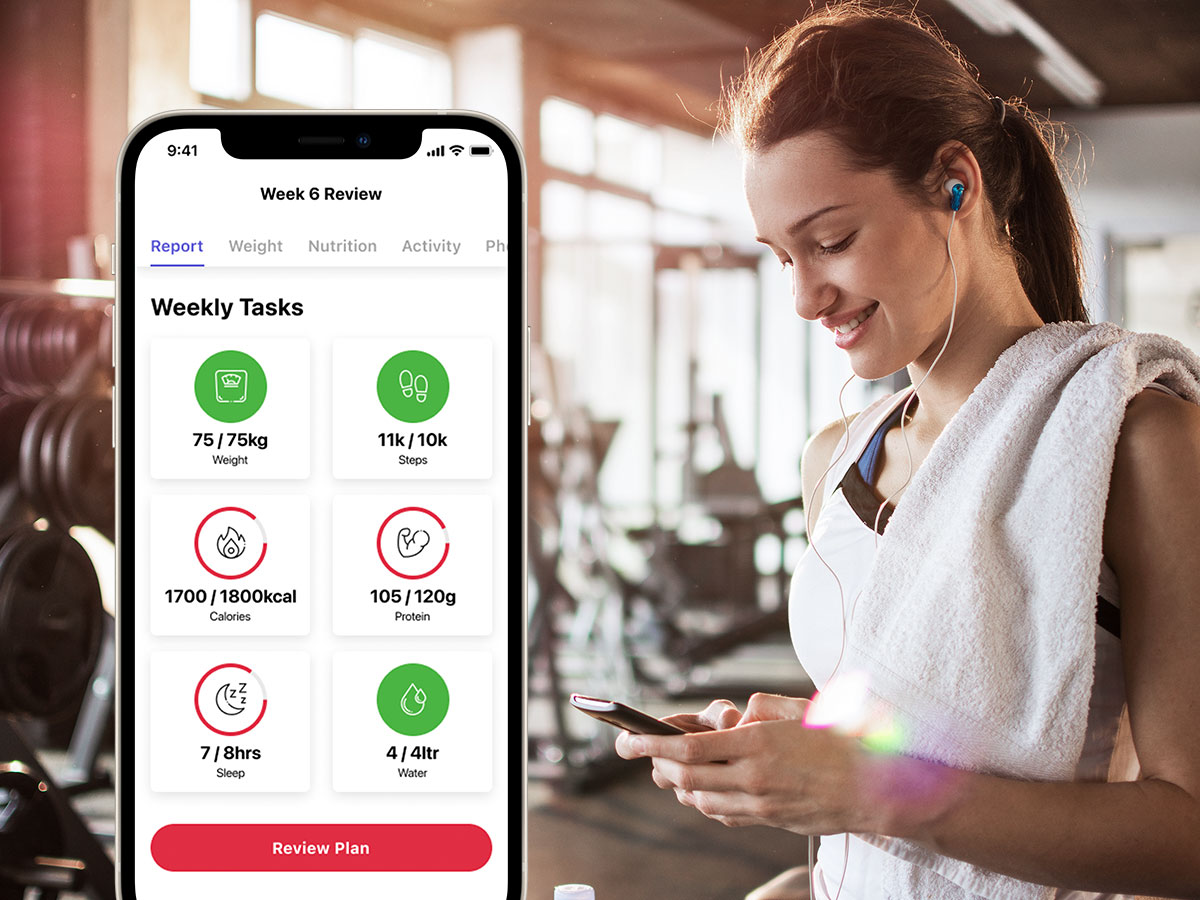
2. Plan your meals during Ramadan
What’s the key to any successful weight loss or body transformation diet? Planning and organisation.
Ensuring that you have all your meals planned and prepared in advance means you’re far more likely to stick to your diet plan, which ultimately improves long-term weight loss and fat loss success.
If you leave your meals to chance and just grab something when you’re hungry, you’re more likely to make bad food choices when Iftar comes around.
After a full day of fasting, it’s easier to just gorge on the kinds of foods that taste great but are terrible for your body composition goals.
So having healthy meals ready and waiting for when you break your fast that meets your calorie needs and macronutrients goals is key. Become a master of Meal prep, and you will breeze through Ramadan.
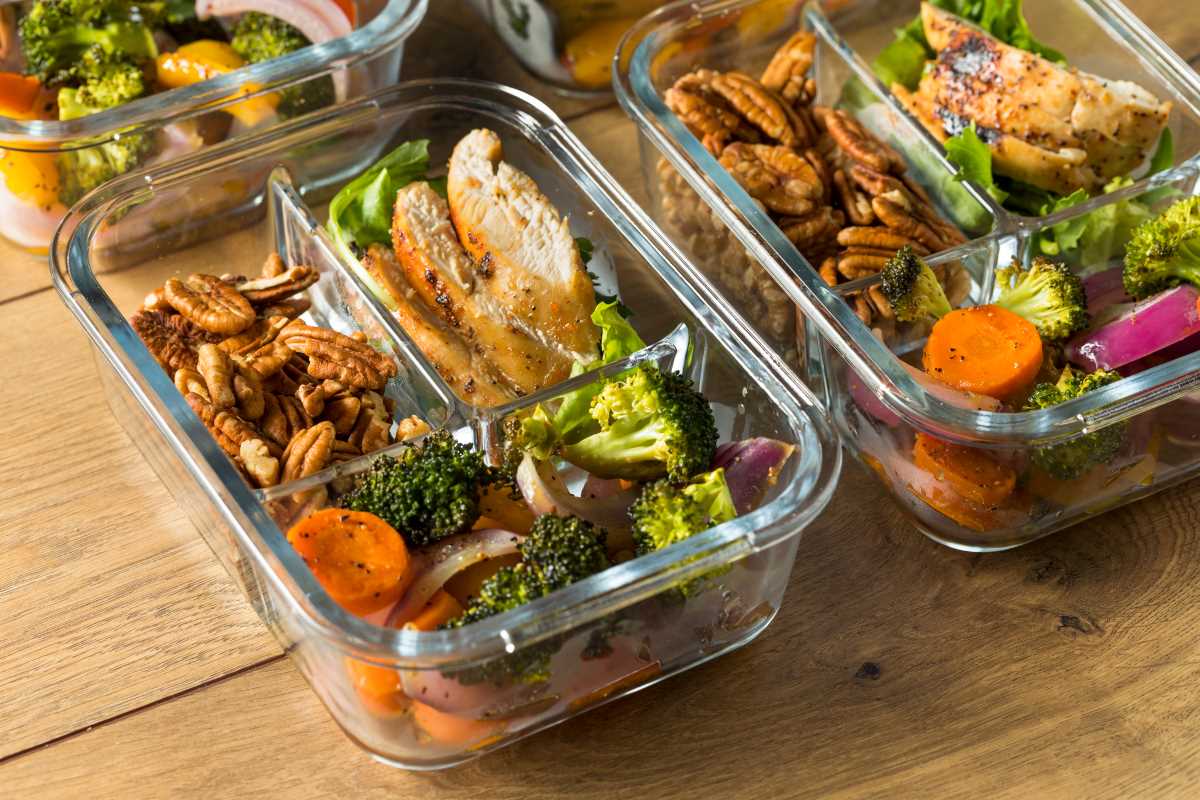
3. Meal prep where possible during Ramadan
Meal prep is the easiest and most effective way to stay on track with your diet.
Once you’re on a fat loss plan and you know your calorie totals and macronutrient goals, get batch cooking some go-to healthy meals and portion them out in Tupperware boxes ready for when you need them.
Spending an hour or so a week planning your food and meals for the coming seven days over Ramadan will save you loads of cooking time in the long run. Plus, buying and cooking in bulk is more cost-effective than grabbing a meal from a shop or getting food in a restaurant or takeaway.
Prepping at home also means you know exactly what you’re getting in your food calories- and macronutrients-wise.
Who knows how many hidden calories are in the so-called ‘healthy’ foods you will get at your local restaurant or supermarket?
Batch cooking your protein sources is very simple – it only takes half an hour at most to cook off a batch of chicken fillets or steaks.
It’s equally simple to throw some basic ingredients like meat vegetables and stock in a slow cooker and leave them to simmer all day, ready for Iftar. When it comes time to break your fast, you will have a delicious and nutritious meal ready and waiting.
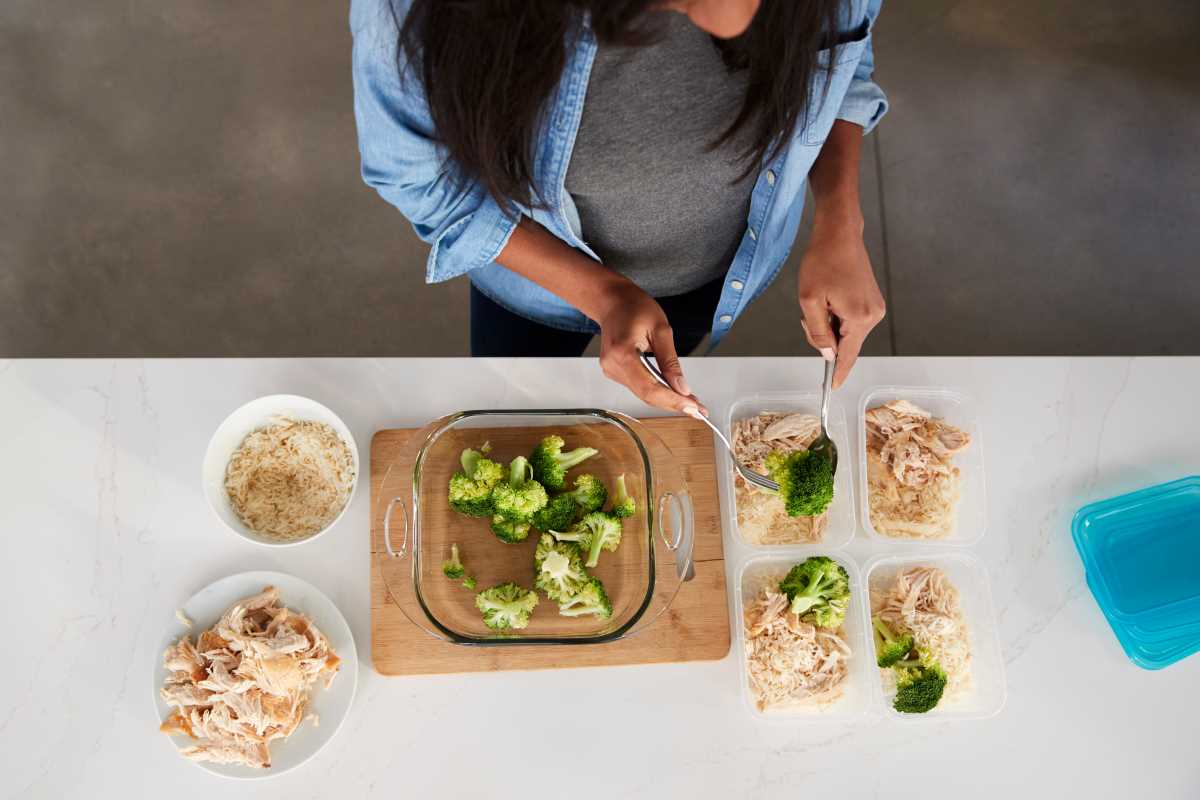
4. Plan for eating out during Ramadan
During Ramadan, there will be times when you will be enjoying social occasions and eating out with family and friends.
It can be challenging to stay on track with your diet when you’re out for a meal unless you plan.
It’s always advisable to check the menu before you arrive to see which meal best fits your meal plan or dietary needs. You can also order your food ahead of time so you avoid making any impulsive food choices on the spot when you are hungry or faced with temptation.
Keep it simple and go for something like steak and vegetables – you’ll be able to track the number of calories on your food tracker app. Say no to ‘extras’ when you order. Things like coleslaw, onion rings, fries, sauces and added cheese are added extras that will seriously bump up the calorie count of the meals.
Restaurants are always amenable to making food substitutes, so don’t be afraid to ask.
Good swaps are fries for green vegetables and salads without dressings and always base your meal around a good source of protein.

5. Drink plenty of water after you break your fast
During Ramadan, you must rehydrate as fully as possible when you break your fast, particularly if you live in hot climates, have a physical job or do high-intensity exercise.
Water is key to the optimal functioning of your body and your brain. Dehydration is responsible for the downregulation of almost every cellular process in the body.
Not getting adequate water can also affect muscle protein synthesis, and even 3% dehydration can dent your strength and power output in the gym.
If fat loss is your goal, then hydration is a must. Without enough water, the liver will metabolise less fat because it has to take over some of the functions of the kidneys when you are dehydrated.
When it comes to adequate hydration follow these guidelines:
- Try and aim for a steady intake of 2-3litres between Iftar and Suhur
- Try to avoid sugary drinks or foods high in salt, which will make you more thirsty
- Prioritise electrolytes, as your body needs this to function properly. The most common types are sodium, potassium and calcium. These can be found in various fruits and vegetables, or you can add electrolyte powder or tablets to your water.
- Break your fast with foods that have a higher water content such as watermelon and strawberries.
- Cold showers can help especially if you live in warmer climates. Other alternatives can be a wet towel which you can apply to your neck, around your ears, upper back and chest.

How to manage your sleep during Ramadan
The relationship between sleep and weight loss is well documented by science.
Sleep is vital for ensuring optimum health, recovery, performance and ultimately helps you realise your fat loss goals.
But when fasting during the holy month, sleep becomes even more important to counter the stress it puts on your body.
Getting enough quality sleep is important for a healthy hormonal balance. Firstly it’s when your body produces the most testosterone and growth hormone (important for both men and women). It also helps reduce the stress hormone cortisol, which, when you’re deprived of sleep, is increased to keep your body running but results in lower ‘real’ energy, mental fog, fatigue and hunger cravings.
We always recommend that you try and achieve between 7-9 hours of good quality sleep.
However, during Ramadan, this is difficult to achieve in one go with people wanting to make the most of the social occasions and periods of eating. So splitting this into two phases can also work.
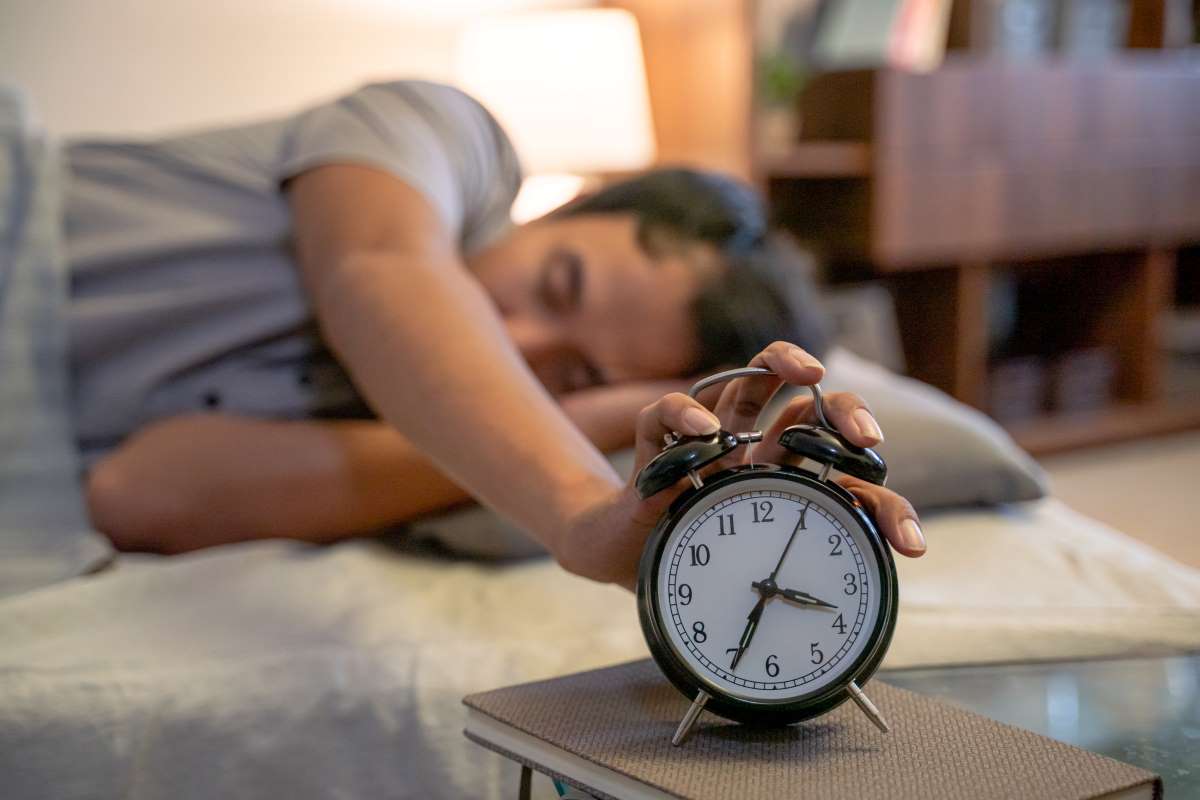
How Supplementation can help when fasting
Alongside your training, nutrition and lifestyle changes, supplementation can be helpful to plug any gaps.
- Magnesium can help calm the nervous system and promote restful sleep.
- Whey protein powder is fast and easily digestible and can help with hitting protein intake targets.
- With a very short eating window, digestive enzymes can help improve digestion.
- Chocotrients is a chocolate greens powder full of nutrients to support your immune system, and it’s delicious!
Key Takeaways
Ramadan is a special time of worship, spirituality and self-reflection for millions of Muslims across the globe.
The 30-day period of fasting can be challenging, and it can be very tempting to abandon your fitness and health goals.
But it’s possible to complete the holy month with improved fat loss while remaining fit and healthy.
The main things to remember are:
- Always plan ahead
- Track your calorie intake
- Ensure you eat optimally with foods that are conducive to fat loss goals
- Stay hydrated every day
- Stick to your strength training regime
- Stay active every day.
- Get advice on your training and from a fitness professional
Following these tips will ensure you progress towards your goals during the month of Ramadan.
Find out more
Learn how our Ultimate Performance trainers approach training and nutrition during Ramadan here!






